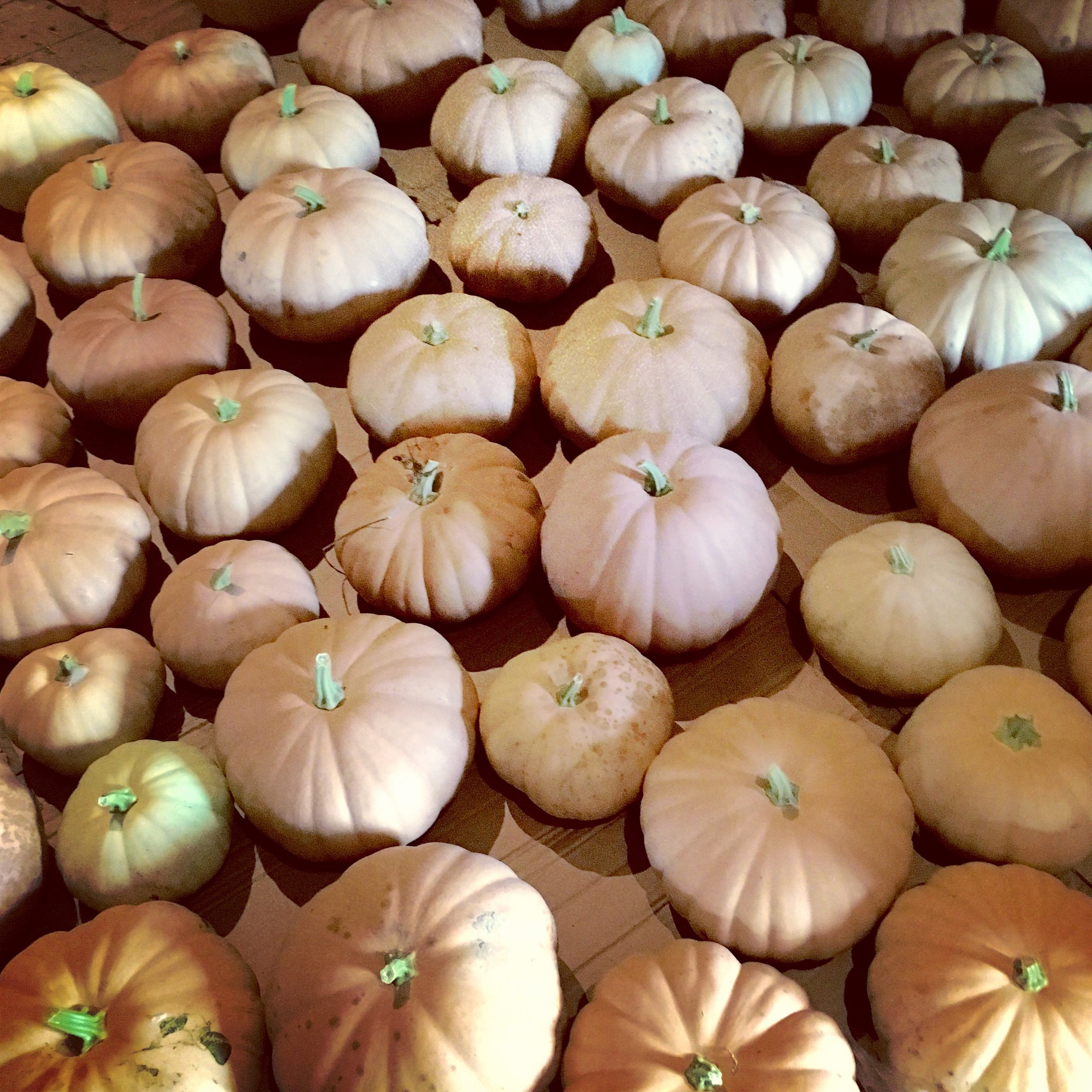The Long Island
Cheese Pumpkin Project
Logo courtesy of and created by Laura Luciano.
2020 UPDATE
We cannot vouch for the narrative of this variety or that there is an actual distinct heirloom named the “Long Island Cheese Pumpkin”. We championed this variety in this large project, as an heirloom saved by a singular seed saver when it was freely available. We wanted to have a local variety that could celebrated locally as a community, as the original project intended.
We deeply apologize for the lack of research and critical questions when it comes to seed stories, especially this one. Critically important is the necessity in trying to give the fullest story possible; without neglecting or negating another individual, community or cultures role in that history. It is irresponsible to do so.
Archival data which we have been compiling for the past year for publication show that the cheese pumpkin was a “Pre-Spanish” point of contact or indigenous squash to the Americas.
Variations of Cheese Pumpkins are found the world over. There are well over 100 varieties that qualify as a “cheese pumpkin” if not more.
It was first discussed in 1841 as having “confusing nomenclature” (variety names and sometimes phenotype) which still persists today. This pumpkin was called plethora of names by not only various seed companies, but also by botanical sources. The genesis and evolution of those names we have found is still a work in progress. For example, sometimes this variety was synonymous with “Kentucky Field” pumpkin or “Buff Pie” pumpkin; depending on who was telling the story.
The cheese pumpkin, its culinary use and availability has been found continuously in sources since 1841 as being readily available, in seed catalogs, cookbooks, and other pertinent references. There only a few references of a “Long Island Cheese Pumpkin” strain by a seed company in 1951.
Seed companies often renamed an ubiquitous variety a “strain”or a variation of the name in order to differentiate themselves from other seed companies. Meaning, they sold the same exact variety under very different names.
By self report, Ken Ettlinger states he gave Curtis Showell the “Long Island Cheese Pumpkin” (as per Ken: with an abundance of diversity that he collected from farmstands) and several of types of other cheese pumpkins; to replicate in a large field for commercial sale. Mr. Showell it seems, likely made this a mass cross and then a stabilized selection from that cross. It was then sold to various seed companies for distribution with a singular place and producer of origin, Curtis Showell.
This amalgamation of genetics, once stabilized, began to be offered by major catalogs as a “Long Island Cheese Pumpkin”, as heirloom varieties began to pick up interest in the purchasing public.
Unfortunately, as a general rule, singular perspective narratives of seeds are sometimes told with an agenda. Gratefully, this is a small percentage of individuals that have done this over time.
Seeds are taken from gene banks, farmers markets or even supermarkets and intentionally renamed. Sometimes seeds are given to an individual by breeders with Material Transfer Agreements that are violated. Metaphorically, it’s like an author giving an editor a book to edit and then the editor publishes the book under his own name.
We have absolutely no information as to the names of the farms these seeds on Long Island were collected from. We have no evidence, at all, within any archive or proof that the cheese pumpkin was becoming extinct. Ever.
Given the fact that the great variety of a type of pumpkin, a “cheese pumpkin”s and their crosses were used and replicated for commercial use; no one can verify that the “Long Island Cheese Pumpkin” was ever actually on Long Island as a single genetic line and distinct variety.
Various community seed shareholders and seed savers have doubted this story of the Long Island Cheese Pumpkin and only then we began to deeply research this variety. Our continued research may also yield results that put more pieces of this variety together so it more resembles Ken Ettlinger’s original story.
We will not recycle the same origin story we have been told and that continues to be told almost verbatim without more evidence.
If you have any archival data or perspective we can add; we would love to include it.
This page will updated periodically to reflect new information.
2019 UPDATE
We have suspended this project until we can verify sources and genesis of this specific variety to ensure accuracy of a shared narrative.
Cheese pumpkins are a historically common type of winter storage pumpkin; seeds are saved, plants are grown and fruits are utilized on a global scale. In North America, this type of crop pre-dates European contact with indigenous societies and has enjoyed continued culinary use internationally as the seeds migrated globally.
Sent by a cucurbit collector who received material from LI Seed. Photo courtesy of Ken Ettlinger of LI Seed.
Below is the description and brief history of the project as initiated in 2015 as it was related to us.
In October 2015, the founders, Cheryl Frey and Steph Gaylor were discussing underutilized regional varieties on a car ride to hear Vandana Shiva talk in Bridgehampton. It was from this discussion that the Long Island Cheese Pumpkin Project was born and blossomed into a widespread championing of a variety. The Long Island Regional Seed Consortium (LIRSC) then developed and implemented The Long Island Cheese Pumpkin Project in an effort to get various food system shareholders behind this local Long Island variety that had disappeared commercially from seed catalogs in the 1970’s.
This seed was collected and saved by a local seed saver, Ken Ettlinger and the pumpkin is being grown at a few farms currently, but it is not widely utilized or even known about on Long Island.
The mission of The Long Island Cheese Pumpkin Project is to preserve, restore, and bring awareness of this local Long Island variety. We advocate for the dynamic use of this regional pumpkin across a broad spectrum of organizations creating a coalition that includes chefs, growers, schools, and eaters. In an effort to raise awareness for the project, the LIRSC reached out to local farms, growers, chefs and not for profit organizations to encourage growers to not only plant the pumpkin, but to help teach consumers ways to prepare it and save the seeds for a new crop the following year.
In the winter of 2015, like-minded collaborators met with the LIRSC to form the LICPP ambassador program to help facilitate the distribution, growing, consumption and saving of the pumpkin. Each collaborator worked with their own organization to promote the project. Through these collaborations; the project gained national and international attention.
In the late summer of 2016, through the Long Island Cheese Pumpkin Project, Blue Point Brewing Company brewed the very first Long Island Cheese Pumpkin beer, school gardens harvested pumpkins (one a whopping 30lbs!), chefs and restaurants created new and delicious cheese pumpkin recipes, and the importance of maintaining the LICP for future generations caught fire.
In November of 2016, an impressive panel of professionals met to celebrate and discuss not only the important history of regional varieties, but how all can collaborate to maintain such varieties for future generations to enjoy.
The Long Island Regional Seed Consortium continues to maintain the LICP seed and fully research the historical importance of this one amazing pie pumpkin!
Collaborating and coordinating with farmers, breeders, non-profits, seed libraries, chefs, school gardens and gardeners to grow the LI Cheese Pumpkin
Provide support and education concerning this program
Ambassador program of the cheese pumpkin which will highlight the pumpkin within the organization. These organizations will have various tools and programs particular to the group.
Researching archival materials and creating materials for purposes of historicity.
LICP Ambassadors include:
Farms
Invincible Summer Farms, Southold, NY
Restoration Farm, Bethpage, NY
Milk Pail Farms, Watermill, NY
Restaurants
Northfork Table and Inn
Cookshop, NY
Hundred Acres, NY
Vic's, NY
Rosies, NY
SEED COMPANIES
Hudson Valley Seed Company
Salt of the Earth Seeds
NON-PROFITS
Hallockville Museum Farm
Amagansett Food Institute
Slow Food East End
Eat Local NY
ADDITIONAL AMBASSADORS
Chris Gerdes - chef
Sid Wainer - distributor
Laura Luciano - home cook and blogger of “Out East Foodie”
Edible East End - publication
Edible Long Island - publication




